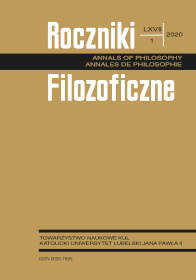Character, Goodness: In Relation to the Autobiographical Novel by Raimond Gaita My Father Romulus
Abstract
The purpose of the text is to demonstrate a distinction between good or virtue and evil or vice, introduced by Hannah Arendt on the grounds of the novel by Hermann Melville Billy Budd. I analyze this distinction in relation to the life story of Romulus Gaita, the hero of the autobiographical novel My father Romulus, written by the Australian ethicist Raimond Gaita. The first paragraph deals with the said distinction, indicating the re-evaluation of such concept as virtue and vice in Melville’s novel and his understanding of virtue. Then (paragraph 2), I make an attempt to answer the question of why Gaita writes about his father using a category of character instead of virtue. Then (paragraph 3), I reflect on the relationship between virtue, character, goodness and Romulus’s mental illness. Finally (paragraph 4), I answer the question about the metaphysical foundation on which Gaita forms his conviction about the superiority of Good and goodness over virtue, and I show what particular components make up the ethics of goodness assumed by Romulus.
References
Annas, Julia. 1995. „Virtue as a skill”. International Journal of Philosophical Studies 3 (2): 227–243.
Arendt, Hannah. 1991. O rewolucji. Przełożył Mieczysław Godyń. Kraków: Wydawnictwo X, Dom Wydawniczy TOTUS.
Arystoteles. 1996. Etyka Nikomachejska. Przełożyła Daniela Gromska. Warszawa: PWN.
Bloom, Harold. 2002. Genius: A Mosaic of One Hundred Exemplary Creative Minds. New York: Warner.
Bremer, Józef. 2001. Ludwig Wittgenstein a religia. Wprowadzenie. Kraków: Wyższa Szkoła Filozoficzno-Pedagogiczna.
Doris, John M. 2002. Lack of Character: Personality and Moral Behavior, Cambridge: Cambridge University Press.
Flanagan, Owen. 1991. Varieties of Moral Personality: Ethics and Psychological Realism. Harvard: Harvard University Press.
Gaita, Raimond. 2002. A Common Humanity. Thinking about Love and Truth and Justice. London, New York: Routledge, Taylor & Francis Group.
Gaita, Raimond. 2004. Good and Evil. An Absolute Conception. Second Edition. London, New York: Routledge, Taylor & Francis Group.
Gaita, Raimond. 2013. Mój ojciec Romulus. Przełożyła Magdalena Budzińska. Wołowiec: Wydawnictwo Czarne.
Gaita, Raimond. 2007. „Romulus, My Father: From Book to Screenplay to Film”. W: Nick Drake. Romulus, My Father: Screenplay, vii–xxiv. Sydney: Currency Press.
Głąb, Anna. 2010. Rozum w świecie praktyki. Koncepcja filozofii Marthy C. Nussbaum. Warszawa: Wydawnictwa Akademickie i Profesjonalne.
Haidt, Jonathan. 2007. Szczęście. Od mądrości starożytnych po koncepcje współczesne. Przełożyła Agnieszka Nowak. Gdańsk: Gdańskie Wydawnictwo Psychologiczne.
Hardie, William Francis. 1968. Aristotle’s Moral Theory. Oxford: Clarendon Press.
Harman, Gilbert. 1977. The Nature of Morality: An Introduction to Ethics. Oxford: Oxford University Press.
Haybron, Daniel M. 2013. Happiness. A Very Short Introduction. Oxford: Oxford University Press.
Jaśtal, Jacek. 2004. Etyka cnót, etyka charakteru. W: Etyka i charakter. Wybrał i przełożył Jacek Jaśtal, 7–42. Kraków: Aureus.
Kant, Immanuel. 2005. Metafizyczne podstawy nauki o cnocie. Przełożył Włodzimierz Galewicz. Kęty: Wydawnictwo Antyk.
Malcolm, Norman. 1999. Ludwig Wittgenstein: wspomnienie. Przełożyli Katarzyna Gurczyńska i Jacek Gurczyński. Lublin: Wydawnictwo UMCS.
Melville, Herman. 1966. Billy Budd. Przełożył Bronisław Zieliński. Warszawa: Państwowy Instytut Wydawniczy.
Miller, Christian B. 2013. Moral Character: An Empirical Theory. Oxford: Oxford University Press.
Nussbaum, Martha. 1995. „Aristotle on Human Nature and the Foundations of Ethics”. W: World, Mind, and Ethics: Essays on the Philosophy of Bernard Williams, red. J.E.J. Altham and Ross Harrison, 86–131. Cambridge: Cambridge University Press.
Olubas, Brigitta. 2014. „Romulus, My Father and the Australian Literary Imaginary”. W: A Sense for Humanity. The Ethical Thought of Raimond Gaita, red. Craig Taylor and Melinda Graefe, 37–49. Victoria: Monash University Publishing.
O’Neill, Onora. 2009. „Etyka Kantowska”. Przełożył Paweł Łuków. W: Przewodnik po etyce, red. Peter Singer, red. naukowa polskiego wydania Joanna Górnicka, 214–225. Warszawa: Książka i Wiedza.
Platon. 2007. Obrona Sokratesa. W: idem. Dialogi. Przełożył Władysław Witwicki. Wybrał, przejrzał, przedmową i objaśnieniami opatrzył Andrzej Lam, 181–223. Warszawa: Unia Wydawnicza „Verum”.
Russell, Daniel C. 2015. „Aristotle on Cultivating Virtue”. W: Cultivating Virtue. Perspectives from Philosophy, Theology, and Psychology, red. Nancy E. Snow, 17–49. Oxford, New York Oxford University Press.
Szutta, Natasza. „Status współczesnej etyki cnót”. Diametros 1 (2004): 70–84. Dostęp on-line: http://www.diametros.iphils.uj.edu.pl/index.php/diametros/article/download/17/13.
Tanesini, Alessandra. 2016. „Teaching Virtue: Changing Attitudes”. Logos & Episteme 7, 4: 503–527.
Wittgenstein, Ludwig. 1995. Wykład o etyce. W: idem. Wykłady o religii i etyce. Przełożył Wojciech Sady, 75–85. Kraków: Znak. Dostęp on-line: http://sady.up.krakow.pl/wittgenstein.we.htm.
Witwicki, Władysław. 1939. O typach charakteru. Warszawa: Wydawnictwo Sekcji Psychologicznej Towarzystwa Wiedzy Wojskowej.
Copyright (c) 2020 Roczniki Filozoficzne

This work is licensed under a Creative Commons Attribution-NonCommercial-NoDerivatives 4.0 International License.





